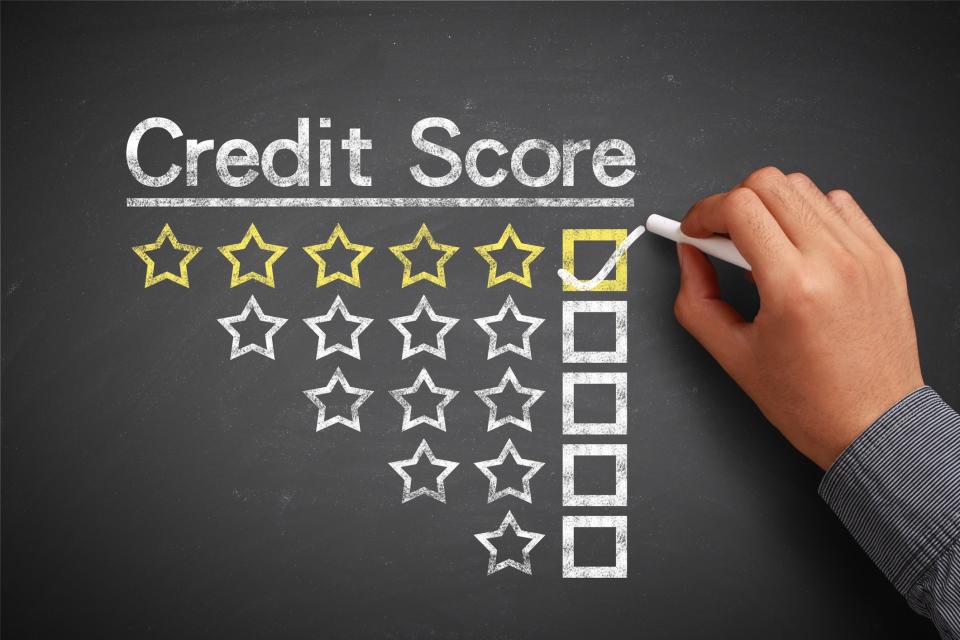What Is an Excellent Credit Score?
A strong credit score is one way you can increase your chances of getting approved for a loan and secure a more favorable a rate. An 'excellent' credit score will give you the most benefit when loan shopping.

Image Source: Getty Images.
A FICO® Score of 800 or above is considered excellent, and means you're likely to gain access to the best rates available. It also means you shouldn't hesitate to consult our list of best credit cards for excellent credit, because you stand a good chance of getting approved. And if you don't currently have excellent credit, worry not -- we'll show you how to increase your score so you have more options for borrowing in the future.
What is an excellent credit score?
Your credit score can fall anywhere in the 300-850 range, and while less than 1% of consumers have perfect credit, snagging an excellent score is more attainable than you might think. The following table shows how Experian, one of the three major credit bureaus, classifies different credit scores, as well as the estimated number of consumers who fall into each category:
FICO® Score | Classification | Percentage of Consumers |
800-850 | Excellent | 19.90% |
740-799 | Very good | 18.20% |
670-739 | Good | 21.50% |
580-669 | Fair | 20.20% |
300-579 | Poor | 17% |
How credit scores are determined
There are several factors that go into calculating your credit score, and understanding how bureaus arrive at your score can help you take steps to improve it. Here's a quick breakdown:
Payment history: An established pattern of paying your bills on time will work in your favor.
Credit utilization ratio: The percentage of available credit you're using at any given point plays a role in determining your score. Lenders like to see a credit utilization ratio of 30% or less.
Credit history: The length of time you've had your accounts open can affect your score as well. This is one category where younger borrowers are at a disadvantage.
New accounts: Opening too many new accounts at the same time can hurt your score, partially because you may come off as a reckless borrower, but also because each new application results in a hard inquiry into your credit history. While soft inquiries, such as checking your own credit report, won't hurt your score, hard inquiries can bring it down.
Credit mix: The different types of accounts you have open also influence your score -- meaning there's a difference between opening up a bunch of store credit cards or having a mix of credit card, mortgage, and student loan accounts.
Keep in mind that some of these categories carry more weight than others when determining your score. Your payment history and credit utilization ratio play the largest role in figuring your score, while your credit history, new accounts, and credit mix play a smaller role. You shouldn't, however, take that to mean that it's OK to ignore any single component on the list.
The percentage of consumers with excellent credit is similar to that of all other categories. In other words, it's not just an elite few who have excellent credit, so if you commit to working on your score, you might land in that coveted 800-850 range pretty quickly.
How to raise your credit score
If you're looking to build up your credit score, then you'll need to address each of these factors individually to the best of your ability. While you can't add years to your credit history that don't exist, you can make a point of paying all future bills on time, and, ideally, in full, to boost your payment history.
Similarly, if you make a point to never use more than 30% of your available credit, you can keep your utilization ratio in that ideal 30% or less range. Keep in mind that the amount of your outstanding debt is less important than what percentage of available credit it constitutes. If you owe $4,000 on a $10,000 line of credit and your neighbor owes $5,000 on a $20,000 line of credit, his credit utilization ratio will be under 30%, while yours won't, even though his debt load is higher.
Finally, make a habit of reviewing your credit report regularly to check for mistakes. An estimated 20% of credit reports contain errors, and fixing one could boost your score overnight.
What are the benefits of excellent credit?
Having excellent credit isn't just a matter of pride; it's a matter of getting the best financing terms available whenever you attempt to borrow money.
Say you're applying for a $300,000, 30-year fixed mortgage. With excellent credit, you might snag a 3.696% APR, which translates to a monthly payment of $1,380. A score that's good but not excellent, meanwhile, will get you a 4.095% APR with an associated monthly payment of $1,449 -- still competitive, but not nearly as attractive.
Similarly, some of the top-tier credit cards out there are designed specifically for folks with excellent credit. These cards offer perks such as generous sign-up bonuses, killer rewards programs, and low or nonexistent annual fees. Of course, consumers with good credit have their share of credit card options as well, but to be eligible for the very best offers out there, you'll need to hit that excellent range. And the sooner you do, the more you stand to save.
The Motley Fool owns and recommends MasterCard and Visa, and recommends American Express. We’re firm believers in the Golden Rule. If we wouldn’t recommend an offer to a close family member, we wouldn’t recommend it on The Ascent either. Our number one goal is helping people find the best offers to improve their finances. That is why editorial opinions are ours alone and have not been previously reviewed, approved, or endorsed by included advertisers. Editorial content from The Ascent is separate from The Motley Fool editorial content and is created by a different analyst team.
